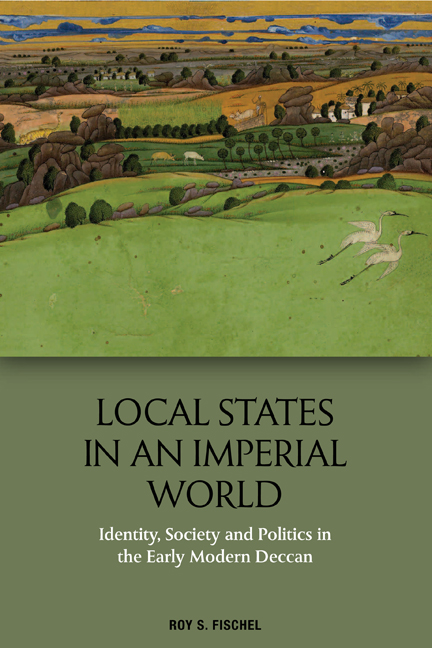Book contents
- Frontmatter
- Contents
- List of Illustrations and Tables
- Note on Transliteration
- Acknowledgements
- Introduction
- 1 Mapping the Deccan
- 2 The Sultanates and the Deccan
- 3 Foreigners, Locals and the World
- 4 Locality, Vernacular and Political Language
- 5 Limitations of the Deccani System
- 6 Conclusion: Hoopoes and Falcons
- Bibliography
- Index
4 - Locality, Vernacular and Political Language
Published online by Cambridge University Press: 26 September 2020
- Frontmatter
- Contents
- List of Illustrations and Tables
- Note on Transliteration
- Acknowledgements
- Introduction
- 1 Mapping the Deccan
- 2 The Sultanates and the Deccan
- 3 Foreigners, Locals and the World
- 4 Locality, Vernacular and Political Language
- 5 Limitations of the Deccani System
- 6 Conclusion: Hoopoes and Falcons
- Bibliography
- Index
Summary
In the previous chapters we examined the Deccan as the stage on which a unique state system emerged, characterised by parallel contradictory trajectories and the relative weakness of the centre. Elite groups were struggling and reformulating themselves in relation to one another and to the locality, on the one hand, and, on the other hand, to international identities and trans-regional networks. The emphasis on these aspects of political and social life on the Deccan Plateau has clear limitations. First and foremost, the narrative is heavily linked to the Islamic identity of the sultanates, whereas non-Muslims are pushed to the margins. This emphasis is not merely the outcome of modern imagination. Persian and, to some degree, Dakhani sources only seldom discuss non-Muslims. The region as a whole was imagined as an Islamic space, even if carrying its own brand of Islam.
The Deccan, however, was not solely an imagined Islamic space. The political system of all sultanates did not erase centuries of history. From imperial formations with their all-Deccani ideas to vernacular kingdom and their local sensitivities, the establishment of Muslim dynasties did not wipe off all pasts to start from a clean slate. Not only history, locality and memory, but also people, including elites, remained in place. Non-Muslims continued to be the majority of the population, and many non-Muslim elite groups maintained power bases and privilege. In the competitive environment of the early modern Deccan, the sultans did not have any choice but to rely on local expertise and its agents to maintain their military and administrative systems and to successfully position themselves vis-à-vis predatory neighbours. Considering the power relations between relatively weak rulers and powerful ruled, the sultans could not simply force locals into their system. Rather, they had to gain elite cooperation, and to do so quickly, if they wished to keep afloat in the com-bative environment of the sixteenth century. The collapse of Vijayanagara in 1565 and the opportunities it provided the sultans beyond their core regions only intensified the need to appeal to increasingly diverse groups.
The result was an ever-growing effort on behalf of the ruling dynasties to incorporate ideas and forms of expression into their political language that would appeal to local elites. These elements did not come to replace Islamic reasoning and legitimacy. Yet local, non-Muslim voices had a growing impact on the image and direction the sultanates took.
- Type
- Chapter
- Information
- Local States in an Imperial WorldIdentity, Society and Politics in the Early Modern Deccan, pp. 149 - 191Publisher: Edinburgh University PressPrint publication year: 2020



